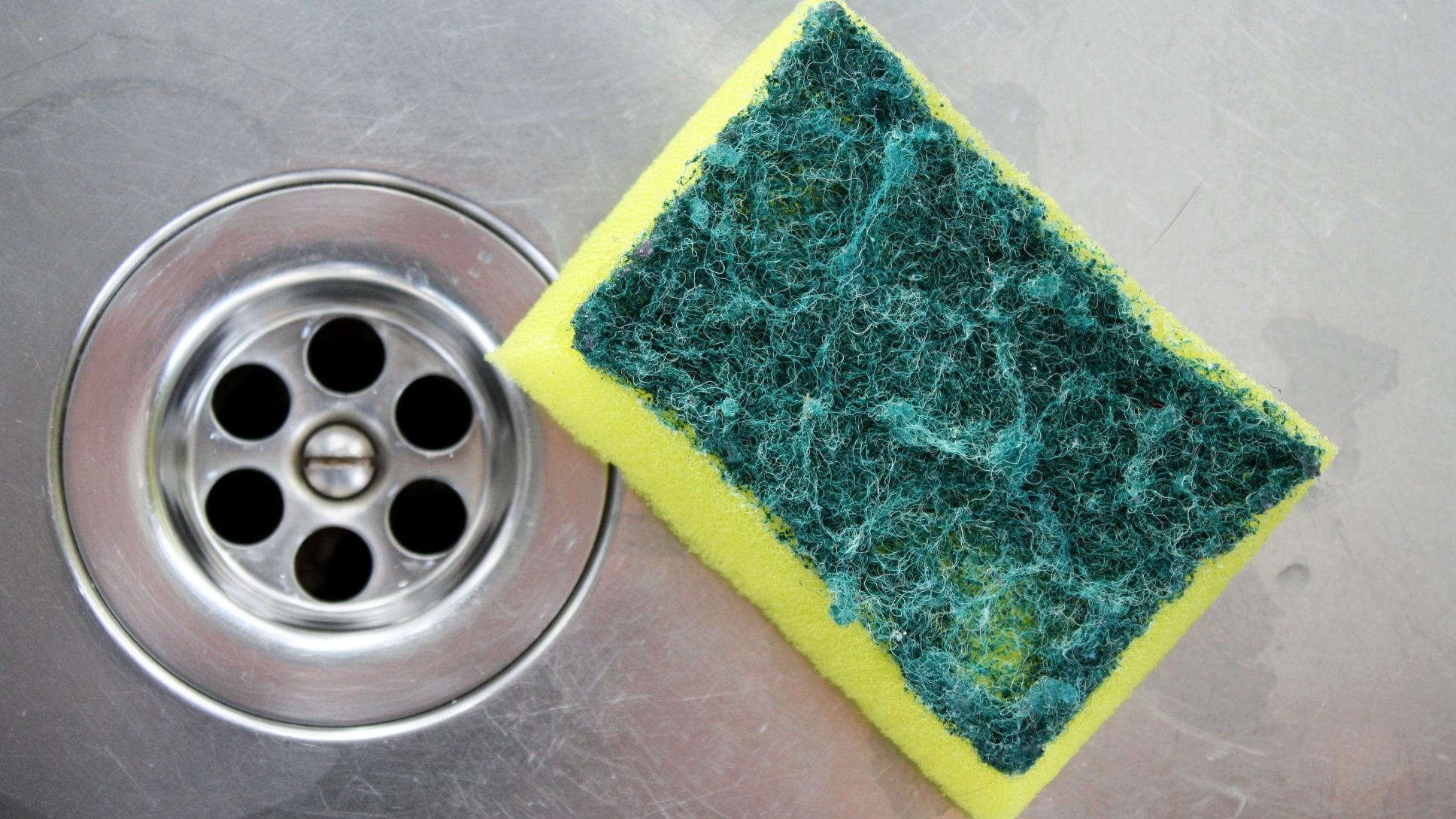How Often Should You Toss Your Kitchen Sponge?
Don't know about you, but all the latest reports about the bacteria your house is filled with, and how sponges are the most disgusting thing in your home, has left me looking at that little yellow rectangle with a considerable side-eye. Yes, I still use sponges to clean the dishes or wipe down tables and counters, but at what cost? How often can I use them safely before throwing them out? Does microwaving them help them last longer? What about putting them in the dishwasher to sanitize? Or should I toss them more frequently, upping my annual sponge budget considerably?
Distraught and confused, I turned to some experts. First, I went with the earth-friendly angle, asking advice from Aaron Durnbaugh, director of sustainability at Loyola University Chicago. He tried to assuage my fears by pointing out the positives of bacteria: "Don't forget, many bacteria are useful. If we get too over-the-top with anti-bacterials, we can also create problems with our immune systems and our gut health." Still, for my sponges, he offered that "microwaving them is supposed to be effective at sterilizing them. Of course, nothing metal, and slightly damp so they don't melt. Two minutes or so." That said, this New York Times article last year states microwaving can only be so effective—it'll "nuke the weak ones, but the strongest, smelliest and potentially pathogenic bacteria will survive." But fortunately, Durnbaugh said, "I suppose you could also drop them in boiling water, which is kind of the same thing. The dishwasher is probably just like sending them to the spa."
For more background, I went to the experts at a nationwide cleaning service. A contact at the firm's local office told me that their cleaners use basic cleaning products like "vinegar and soap and water," as well as mildew remover to kill germs in the kitchen and bath. They do use sponges, as well as microfiber towels, but throw them out daily, after only two or three houses. By my calculations, that housekeeping math works out to about a week of cleaning my own kitchen (and we don't have to remind you to keep your kitchen and bathroom sponges separate, right?)

Solid advice, but I still felt like I needed info from a bacteria expert, so I contacted Erica Smith, former research faculty at Northwestern with 20 years of biomedical research experience, and a Ph.D. in biochemistry and molecular biology. She considers herself a "microbe enthusiast." Unfortunately for me, she was also not a fan of sponges in general. "If you are concerned about bacterial contamination in your kitchen, don't use a kitchen sponge. The nooks and crannies of the sponge are equivalent to those of an English muffin... but for bacteria instead of butter."
That last comment made me want to fling my current sponge right into the bin. But she added, "If you do use a sponge, wring it out after every use so it will dry quickly and replace it weekly. To sanitize, my guess is dishwasher is more effective than microwave. I used to 'sanitize' baby bottles and pumping materials in the dishwasher, which works because of the extended high heat. Microwave sanitization is limited by the size of the thing you are sanitizing and may require longer than you think (consider how you defrost meat, for example). I sometimes soak my sponges in vinegar, but have no scientific evidence to back up the efficacy of that method."
If I decide to forego sponges altogether, then, how should I be cleaning my house? As a first line of defense—just basic hand-washing—Smith recommends warm water and soap. Like the cleaning service, she favors natural, non-fussy cleaners; after the soap, "maybe vinegar, alcohol, bleach." She suggested using a clean dish cloth or towel with vinegar for each cleaning, then throwing it in the laundry.
A more stringent method would be to use alcohol (70 percent or higher). An even more stringent method would be to use 10 percent bleach, which she recommends for serious germaphobes. Smith cautioned against using antibacterial wipes—"bad for the environment (and unnecessary)"—as well as leaving dirty dishes in the sink. If you do so even for longer than a few hours, "The bacteria are likely to proliferate, and then if you use a sponge to clean those dishes and then wipe down all the over surfaces in your kitchen... you are just painting your kitchen with bacteria." Uuuuuhhh, I have done that probably so many times. Maybe I should just move.
Smith points out that time is really the key factor. The longer a surface is dirty and moist and warm, the more suitable it is for bacterial proliferation. She added, "The one thing I do religiously is to use a separate, clean cutting board for meat and then wash immediately."
She made me feel a bit better when she confided, "Having said all that, I have a pile of dirty dishes in and around my sink and two sponges (one really old for 'dirty' jobs, like cleaning out my compost pail, and one moderately old for regular dishwashing). So clearly I'm not too worried about bacterial proliferation and food borne illness."
Good to know. But based on all this new information, my new housekeeping practices will now include: wringing out my sponges more stringently, keeping my sink dish-free, experimenting with using kitchen towels instead, and tossing my sponges on a weekly basis. At least.
